Read Smarter: Read a Book by a Black Scholar
Read Smarter: Read a Book by a Black Scholar

Read Smarter is a reading challenge designed by University of Pittsburgh Press, Manchester University Press, MIT Press, Northwestern University Press, Syracuse University Press, University of Virginia Press, and Princeton University Press. Each month we will highlight one of the challenge prompts and provide suggested titles to help fulfill the prompts.
Our second prompt for Read Smarter is “Read a book by an African American or Black scholar.” For this prompt, the subject of the book is up to you! While this prompt coincides with Black History Month here in the United States, we hope you’ll use this list as a resource all year long to read up on the amazing and important work Black scholars are doing all over the world.
You can download the full checklist here: Read Smarter
Here are some suggestions from participating presses, presented alphabetically by author. Feel free to recommend other titles in the comments. We may occasionally update this list.
 A Place We Call Home: Gender, Race, and Justice in Syracuse by K. Amimahaum Ducre (Syracuse University Press)
A Place We Call Home: Gender, Race, and Justice in Syracuse by K. Amimahaum Ducre (Syracuse University Press)
A Place We Call Home is the first case study of the intersection of Black feminism and environmental justice. The individuals profiled in this book have historically lacked power and status in formal planning processes. Through a cogent combination of words and images, this book illuminates how these women manage their daily survival in degraded environments, the tools that they deploy to do so, and how they act as agents of change to transform their communities.
 Artificial Unintelligence: How Computers Misunderstand the World by Meredith Broussard (MIT Press)
Artificial Unintelligence: How Computers Misunderstand the World by Meredith Broussard (MIT Press)
In Artificial Unintelligence, Meredith Broussard argues that our collective enthusiasm for applying computer technology to every aspect of life has resulted in a tremendous amount of poorly designed systems. We are so eager to do everything digitally—hiring, driving, paying bills, even choosing romantic partners—that we have stopped demanding that our technology actually work. Broussard, a software developer and journalist, reminds us that there are fundamental limits to what we can (and should) do with technology.
 Building Character: The Racial Politics of Modern Architectural Style by Charles L. Davis (University of Pittsburgh Press)
Building Character: The Racial Politics of Modern Architectural Style by Charles L. Davis (University of Pittsburgh Press)
In Building Character, Charles Davis traces the racial charge of the architectural writings of five modern theorists—Eugene Emmanuel Viollet-le-Duc, Gottfried Semper, Louis Sullivan, Frank Lloyd Wright, and William Lescaze—to highlight the social, political, and historical significance of the spatial, structural, and ornamental elements of modern architectural styles.
 Resisting Brown: Race, Literacy, and Citizenship in the Heart of Virginia by Candace Epps-Robertson (University of Pittsburgh Press)
Resisting Brown: Race, Literacy, and Citizenship in the Heart of Virginia by Candace Epps-Robertson (University of Pittsburgh Press)
Drawing upon extensive archival research, Resisting Brown presents the Prince Edward County Free School Association as a site in which important rhetorical work took place. The school’s mission statements, philosophies, and commitment to literacy served as arguments against racialized constructions of citizenship. Prince Edward County stands as a microcosm of America’s struggle with race, literacy, and citizenship.
 Committed to Memory: The Art of the Slave Ship Icon by Cheryl Finley (Princeton University Press)
Committed to Memory: The Art of the Slave Ship Icon by Cheryl Finley (Princeton University Press)
One of the most iconic images of slavery is a schematic wood engraving depicting the human cargo hold of a slave ship. First published by British abolitionists in 1788, it exposed this widespread commercial practice for what it really was — shocking, immoral, barbaric, unimaginable. Committed to Memory provides the first in-depth look at how this artifact of the fight against slavery became an enduring symbol of black resistance, identity, and remembrance.
 American Dream Deferred: Black Federal Workers in Washington, D.C., 1941–1981 by Frederick W. Gooding Jr. (University of Pittsburgh Press)
American Dream Deferred: Black Federal Workers in Washington, D.C., 1941–1981 by Frederick W. Gooding Jr. (University of Pittsburgh Press)
While World War II was a boon to black workers, little is known about the nuanced, ongoing struggles for dignity and respect that black workers endured while working “good, government jobs.” American Dream Deferred challenges postwar narratives of government largess for African Americans by illuminating the neglected stories of these unknown black workers.
 Race and the Obama Administration: Substance, Symbols, and Hope by Andra Gillespie (Manchester University Press)
Race and the Obama Administration: Substance, Symbols, and Hope by Andra Gillespie (Manchester University Press)
The election of Barack Obama marked a critical point in American political and social history. Did the historic election of a Black president actually change the status of Black people in the United States? Did these changes (or lack thereof) inform perceptions of the President? This book explores these questions by comparing Obama’s promotion of substantive and symbolic initiatives for Black people to efforts by the two previous presidential administrations. By employing a comparative analysis, the reader can judge whether Obama did more or less to promote black interests than his predecessors.
 The Dialogues: Conversations about the Nature of the Universe by Clifford V. Johnson (MIT Press)
The Dialogues: Conversations about the Nature of the Universe by Clifford V. Johnson (MIT Press)
Physicist Clifford Johnson thinks that we should have more conversations about science. Science should be on our daily conversation menu, along with topics like politics, books, sports, or the latest prestige cable drama. Conversations about science, he tells us, shouldn’t be left to the experts. In The Dialogues, Johnson invites us to eavesdrop on a series of nine conversations, in graphic-novel form—written and drawn by Johnson—about “the nature of the universe.” The conversations take place all over the world, in museums, on trains, in restaurants, in what may or may not be Freud’s favorite coffeehouse.
 Black Baseball Entrepreneurs, 1902–1931: The Negro National and Eastern Colored Leagues by Michael E. Lomax (Syracuse University Press)
Black Baseball Entrepreneurs, 1902–1931: The Negro National and Eastern Colored Leagues by Michael E. Lomax (Syracuse University Press)
In this book, Lomax takes a closer look at the marketing and promotion of the Negro Leagues by black baseball magnates. He explores how race influenced black baseball’s institutional development and shaped the business relationship with white clubs and managers. Lomax analyzes the decisions that black baseball magnates made to insulate themselves from outside influences. He explains how this insulation may have distorted their perceptions and ultimately led to the Negro Leagues’ demise.
 Paving the Empire Road: BBC Television and Black Britons by Darrell M. Newton (Manchester University Press)
Paving the Empire Road: BBC Television and Black Britons by Darrell M. Newton (Manchester University Press)
Beginning in the 1930s and moving into the post millennium, this book provides a historical analysis of the policies and practices established by the BBC as it attempted to assist white Britons in adjusting to the presence of African-Caribbeans. Among the themes the book explores are current representations of race, the future of British television and its impact on multi-ethnic audiences. The chapters include an extensive analysis of television programming, along with personal interviews that reveal the efforts of black Britons working for the BBC, whether as writers, producers or actors.
 The Alchemy of Us: How Humans and Matter Transformed One Another by Ainissa Ramirez (MIT Press)
The Alchemy of Us: How Humans and Matter Transformed One Another by Ainissa Ramirez (MIT Press)
In The Alchemy of Us, scientist and science writer Ainissa Ramirez examines eight inventions—clocks, steel rails, copper communication cables, photographic film, light bulbs, hard disks, scientific labware, and silicon chips—and reveals how they shaped the human experience. Ramirez tells the stories of the woman who sold time, the inventor who inspired Edison, and the hotheaded undertaker whose invention pointed the way to the computer.
 Steadfast Democrats: How Social Forces Shape Black Political Behavior by Ismail K. White and Cheryl N. Laird (Princeton University Press)
Steadfast Democrats: How Social Forces Shape Black Political Behavior by Ismail K. White and Cheryl N. Laird (Princeton University Press)
Why has ideological change failed to push more black Americans into the Republican Party? Steadfast Democrats answers this question with a pathbreaking new theory that foregrounds the specificity of the black American experience and illuminates social pressure as the key element of black Americans’ unwavering support for the Democratic Party.
 Black Male Frames: African Americans in a Century of Hollywood Cinema, 1903–2003 by Roland Leander Williams Jr. (Syracuse University Press)
Black Male Frames: African Americans in a Century of Hollywood Cinema, 1903–2003 by Roland Leander Williams Jr. (Syracuse University Press)
Black Male Frames charts the development and shifting popularity of two stereotypes of black masculinity in popular American film: “the shaman” or “the scoundrel.” Williams argues that these two extremes persist today in modern Hollywood, where actors such as Sam Lucas, Paul Robeson, Sidney Poitier, Denzel Washington, and Morgan Freeman, among others, must cope with and work around such limited options.
 The Loneliness of the Black Republican: Pragmatic Politics and the Pursuit of Power by Leah Wright Rigueur (Princeton University Press)
The Loneliness of the Black Republican: Pragmatic Politics and the Pursuit of Power by Leah Wright Rigueur (Princeton University Press)
Covering more than four decades of American social and political history, The Loneliness of the Black Republican examines the ideas and actions of black Republican activists, officials, and politicians, from the era of the New Deal to Ronald Reagan’s presidential ascent in 1980. Their unique stories reveal African Americans fighting for an alternative economic and civil rights movement—even as the Republican Party appeared increasingly hostile to that very idea.
What are you reading this month? Let us know in the comments or on social media! Don’t forget to use #ReadSmarter in your posts!

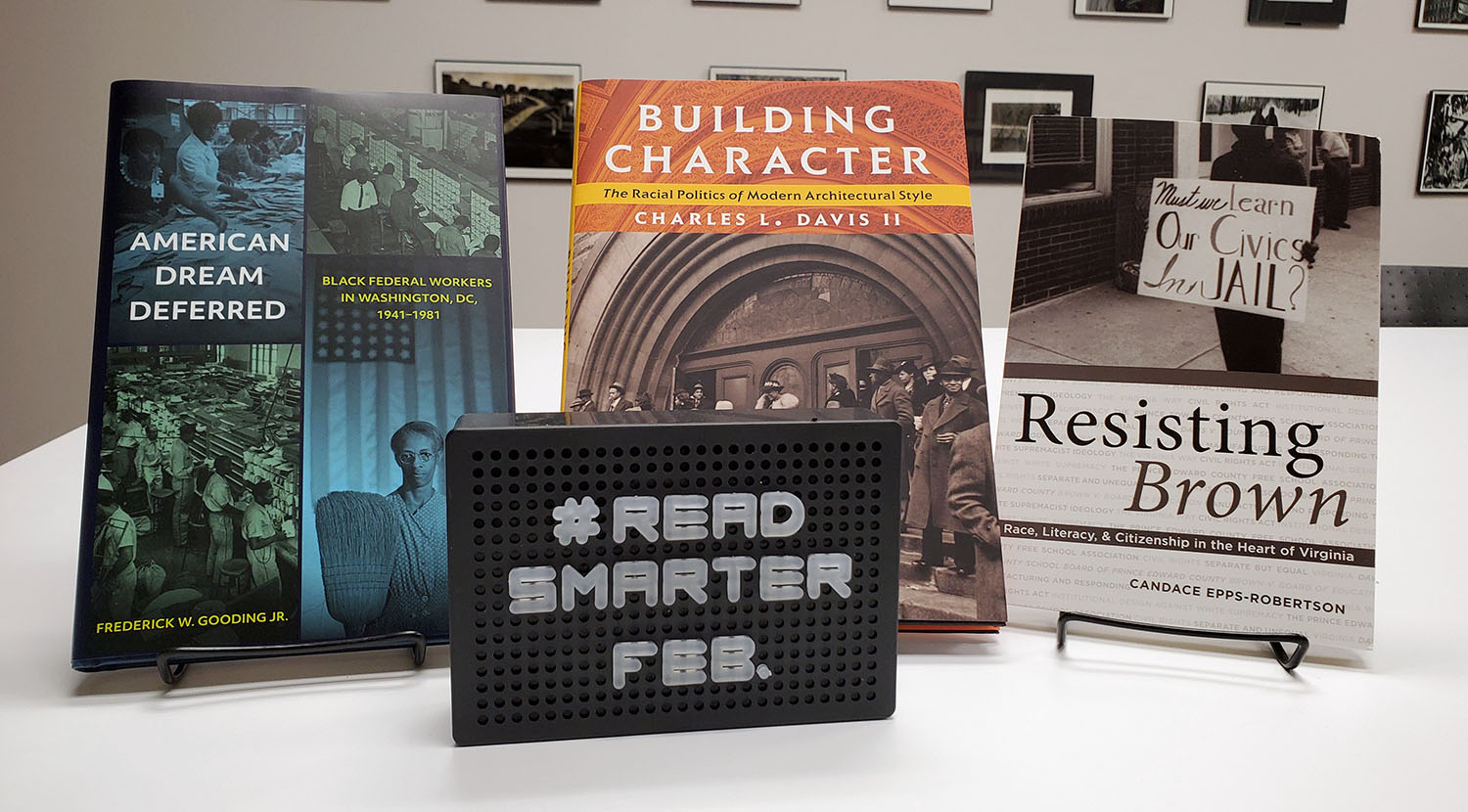
 A Place We Call Home: Gender, Race, and Justice in Syracuse
A Place We Call Home: Gender, Race, and Justice in Syracuse Artificial Unintelligence: How Computers Misunderstand the World
Artificial Unintelligence: How Computers Misunderstand the World 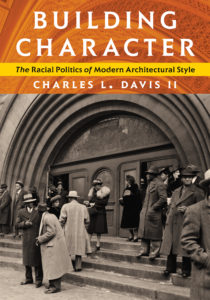 Building Character: The Racial Politics of Modern Architectural Style
Building Character: The Racial Politics of Modern Architectural Style Resisting Brown: Race, Literacy, and Citizenship in the Heart of Virginia
Resisting Brown: Race, Literacy, and Citizenship in the Heart of Virginia Committed to Memory: The Art of the Slave Ship Icon
Committed to Memory: The Art of the Slave Ship Icon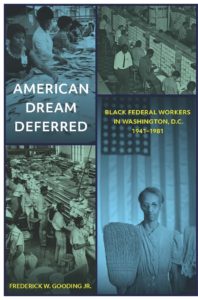 American Dream Deferred: Black Federal Workers in Washington, D.C., 1941–1981
American Dream Deferred: Black Federal Workers in Washington, D.C., 1941–1981 Race and the Obama Administration: Substance, Symbols, and Hope
Race and the Obama Administration: Substance, Symbols, and Hope The Dialogues: Conversations about the Nature of the Universe
The Dialogues: Conversations about the Nature of the Universe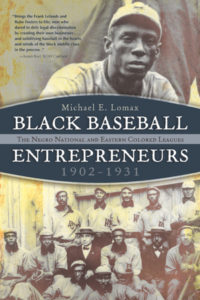 Black Baseball Entrepreneurs, 1902–1931: The Negro National and Eastern Colored Leagues
Black Baseball Entrepreneurs, 1902–1931: The Negro National and Eastern Colored Leagues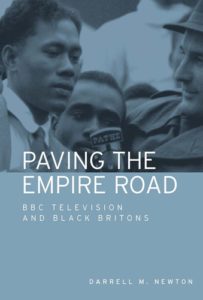 Paving the Empire Road: BBC Television and Black Britons
Paving the Empire Road: BBC Television and Black Britons The Alchemy of Us: How Humans and Matter Transformed One Another
The Alchemy of Us: How Humans and Matter Transformed One Another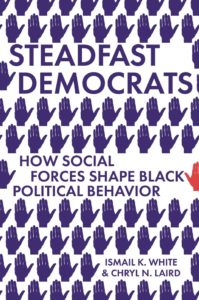 Steadfast Democrats: How Social Forces Shape Black Political Behavior
Steadfast Democrats: How Social Forces Shape Black Political Behavior Black Male Frames: African Americans in a Century of Hollywood Cinema, 1903–2003
Black Male Frames: African Americans in a Century of Hollywood Cinema, 1903–2003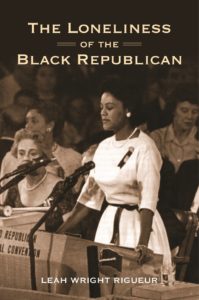 The Loneliness of the Black Republican: Pragmatic Politics and the Pursuit of Power
The Loneliness of the Black Republican: Pragmatic Politics and the Pursuit of Power
COMMENTS